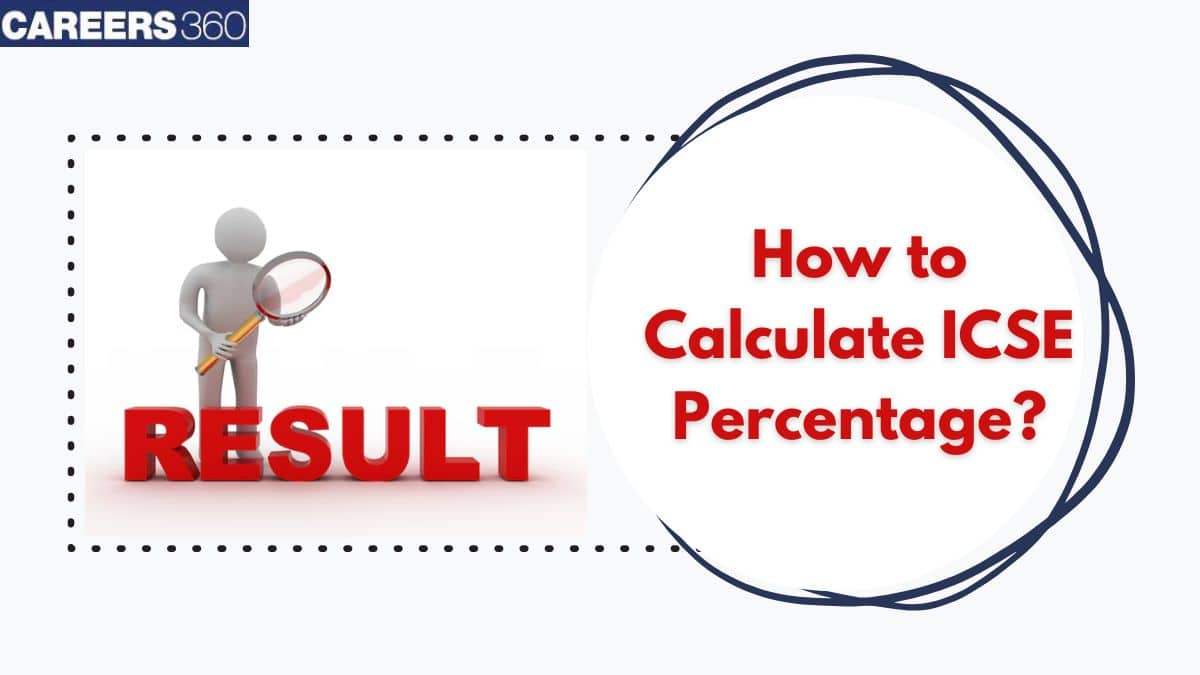How to Calculate ICSE Class 10 Percentage? – Easy Method Explained
The Council for Indian School Certificate Examinations (CISCE) will announce the ICSE results in April 2026 at cisce.org. Students appearing for the exam must score at least 35% marks in aggregate and all subjects separately to pass the examination. This year, the CISCE board will conduct the class 10 exam from February 17 to March 30, 2026.

Students can calculate the expected percentage of CISCE results after the release of the ICSE answer key. Many educational institutions publish the answer key right after the completion of the respective examination. Read this complete article to learn how to calculate the ICSE percentage.
Steps to Calculate ICSE Percentage 2026
To calculate the ICSE percentage, students must follow the best of 5 rule. They have to choose the best 5 out of 6 subjects. Below, we have provided a general percentage calculation method students can follow to calculate their ICSE percentage.
First, add all the top 5 scores.
After that, divide the total by 5.
The result will be the ICSE percentage.
For example, if a student scores the given marks in the ICSE exam,
English: 88
Hindi: 95
History: 94
Maths: 91
Economics: 85
Mass communication: 80
They can choose the best of 5, i.e., 88 + 95 + 94 + 91 + 85 and divide it by 5, which is 453/5 = 90.6%.
ICSE Subject Scheme 2026
The board has divided the ICSE Class 10 subjects into 3 groups.
Group I is compulsory, and students will have to attempt all the subjects
Group II subjects are optional, and candidates have the option to choose at least two or three subjects according to their preference.
From Group III subjects, students can select any one or two subjects from either Section A or B.
Refer to the table below for the ICSE subject scheme for 2026.
Group 1 Subjects (Compulsory) | Group 2 Subjects (Any 2 or 3 subjects) | Group 3 Subjects (Any 1 or 2 subjects) | |
Section A | Section B | ||
English | Mathematics | Computer Applications | Assistant Beauty Therapist |
Second Language (1 or 2) | Science (Physics, Chemistry, Biology) | Economic Applications | Assistant Hair Stylist |
History, Civics, Geography | Economics | Commercial Applications | Basic Data Entry Operator |
Commercial Studies | Art | Dietetic Aide | |
A Modern foreign language | Performing Arts | Cashier | |
A Classical Language | Home Science | Early Years Physical Activity Facilitator | |
Environmental Science | Cookery | Auto Service Technician | |
Fashion Designing | |||
Physical Education | |||
Yoga | |||
Technical Drawing Applications | |||
Environmental Applications | |||
A Modern Foreign Language | |||
Mass Media & Communication | |||
Hospitality Management | |||
Robotics & Artificial Intelligence | |||
Frequently Asked Questions (FAQs)
The board will release the ICSE result 2026 online at cisce.org.
CISCE stands for Council for Indian School Certificate Examinations.
To pass the examination, students must score at least 35% marks in aggregate and in each subject separately.
Questions related to ICSE 10th
On Question asked by student community
Hello! If you’re planning for the ICSE Improvement Exams 2025, practicing with previous year or specimen question papers will be very helpful. These papers can give you a clear understanding of the exam pattern and help you prepare more confidently. Please find the links below.
https://school.careers360.com/boards/cisce/icse-10th-question-papers
https://school.careers360.com/boards/cisce/icse-improvement-exam-2025
Hello
Yes, the ICSE 2026 specimen papers have been released by CISCE in July 2025. These cover key subjects like English, Maths, Science, and Social Studies. You can download them from the official CISCE website under the “Specimen Question Papers” section. They’re designed to help students understand the new exam
The ICSE Class 10 syllabus includes compulsory subjects like English, a second language, History, Civics, and Geography, and students choose two subjects from Group II (e.g., Mathematics, Science, Economics) and one from Group III (e.g., Computer Applications, Art, Home Science). The syllabus emphasizes building strong knowledge and skills, with a
Hello
A minor typo like writing "ICSC" instead of "ICSE" in your IB ACIO application form is generally not a serious issue, especially since you've already contacted the helpdesk and taken the right step to correct it. If the rest of your details like your marks, year, and roll number,
we are providing a guide for ICSE Class 10 exam preparation. Inculcating these ICSE 10th preparation.
you can referr to this link :
https://school.careers360.com/boards/cisce/icse-10th-preparation-tips
Applications for Admissions are open.
As per latest syllabus. Physics formulas, equations, & laws of class 11 & 12th chapters
JEE Main Important Chemistry formulas
Get nowAs per latest syllabus. Chemistry formulas, equations, & laws of class 11 & 12th chapters
JEE Main high scoring chapters and topics
Get nowAs per latest 2024 syllabus. Study 40% syllabus and score upto 100% marks in JEE
JEE Main Important Mathematics Formulas
Get nowAs per latest syllabus. Maths formulas, equations, & theorems of class 11 & 12th chapters
